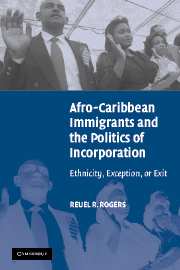Book contents
- Frontmatter
- Contents
- List of Tables
- List of Illustrations
- Acknowledgments
- Strangers at the Gate: Immigrant Political Incorporation in a New Century
- 1 Beyond Black and White: Theories of Political Incorporation
- 2 “Good” Blacks and “Bad” Blacks?
- 3 Letting Sleeping Giants Lie
- 4 Afro-Caribbeans and African Americans: Racially Bound or Ethnically Splintered?
- 5 Afro-Caribbean Sojourners: Home Country Ties and the Hope of Return
- 6 Black Like Who? Afro-Caribbean Immigrants, African Americans, and the Politics of Group Identity
- 7 Black Ethnic Options
- Conclusion: Reconsidering Political Incorporation and Race
- Appendix A Methodology
- Appendix B Interview Schedules
- Bibliography
- Index
2 - “Good” Blacks and “Bad” Blacks?
Published online by Cambridge University Press: 07 November 2009
- Frontmatter
- Contents
- List of Tables
- List of Illustrations
- Acknowledgments
- Strangers at the Gate: Immigrant Political Incorporation in a New Century
- 1 Beyond Black and White: Theories of Political Incorporation
- 2 “Good” Blacks and “Bad” Blacks?
- 3 Letting Sleeping Giants Lie
- 4 Afro-Caribbeans and African Americans: Racially Bound or Ethnically Splintered?
- 5 Afro-Caribbean Sojourners: Home Country Ties and the Hope of Return
- 6 Black Like Who? Afro-Caribbean Immigrants, African Americans, and the Politics of Group Identity
- 7 Black Ethnic Options
- Conclusion: Reconsidering Political Incorporation and Race
- Appendix A Methodology
- Appendix B Interview Schedules
- Bibliography
- Index
Summary
The accident that my ancestors were brought as slaves to the islands while black mainland natives were brought as slaves to the United States is not really that important compared to the common heritage of black brotherhood and unity in the face of oppression.
Shirley ChisholmThe vast gap in the history and worldviews of immigrants from … impoverished Third World count[ries] and long-term citizens of a First World nation can[not] be entirely papered over.
Alejandro Portes and Alex StepickThe classical community studies literature does little to draw analytical distinctions – for instance gender, ethnoregionism, age, and especially ethnicity – among blacks.
John H. Stanfield IIBrooklyn is awash with signs of the Caribbean. All along Flatbush Avenue signals of a vibrant Caribbean immigrant presence shout at even the most casual observer. Storefronts advertise Caribbean nostalgia – the bright green, yellow, and black colors of a Jamaican flag, a palm tree, a stack of island newspapers in the window. But this is not empty symbolism – the Caribbean has come to New York. Small, garrulous groups of men and women congregate in front of Caribbean bakeries and restaurants to discuss the news from back home. Their animated conversations are thick with the inflections of Caribbean dialect. Jitney vans and dollar cabs perilously jockey for position as they compete for fares along the busy thoroughfare. Above the din, the sounds of calypso, reggae, and reggaeton music ring out. This is black New York.
Only a short train ride away is Bedford-Stuyvesant, one of the city's older African-American neighborhoods.
- Type
- Chapter
- Information
- Afro-Caribbean Immigrants and the Politics of IncorporationEthnicity, Exception, or Exit, pp. 43 - 80Publisher: Cambridge University PressPrint publication year: 2006



